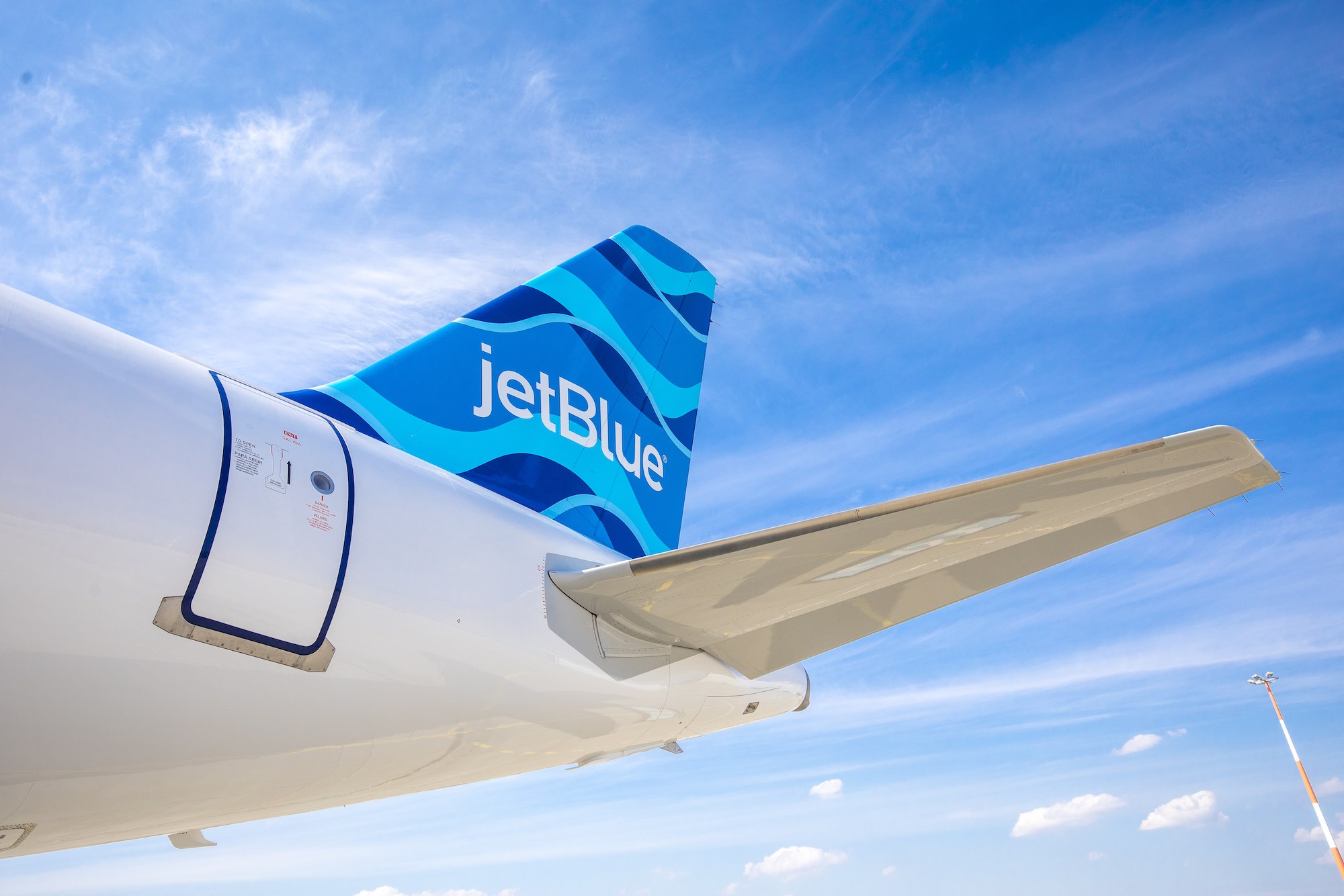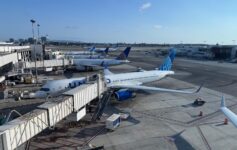
News broke shortly before markets closed today that JetBlue has made an all-cash offer to acquire Spirit Airlines, offering 40% more than Frontier Airlines. JetBlue has just provided the rationale for the merger to its employees.
JetBlue Explains Spirit Airlines Merger To Employees
In a letter to employees obtained by Live and Let’s Fly, JetBlue has outlined seven reasons for its proposed merger with Spirit Airlines.
Dear Crewmembers –
Today we have big news to share with you that could possibly change the future of our airline. We have made an offer to buy Spirit and merge them into JetBlue. As you know, Frontier and Spirit have already announced their own merger agreement, but we’ve made an even better offer that would benefit Customers more than a Spirit-Frontier merger. Spirit is reviewing our proposal now and we believe their shareholders will expect them to seriously consider our offer.
We can all agree that Spirit has a very different brand and product than JetBlue, and so at first glance you may not think we’d make a great pair. However, when you dig deeper, you’ll realize we could be a perfect match. After all, our strong belief has always been that Customers shouldn’t have to choose between a low fare and a great experience, and JetBlue is the only airline that offers both. In the combined airline, JetBlue’s unique product and service at low fares would stay central to what we offer, and our current mission, values and culture would stay core to who we are.
We are so excited about all the benefits this combination would bring:
- It would make JetBlue a stronger national competitor to the big airlines: The “Big Four” airlines have gotten so big they now control 80% of the market. A combined JetBlue and Spirit would make us a competitor on the national stage, allowing us to create a compelling alternative to the “Big Four” while also forcing the legacy carriers to lower their fares and improve service – what has been called the “JetBlue Effect” – for more Customers. The simple truth is no other airline shakes up the market and lowers legacy fares like JetBlue.
- We would grow faster in Fort Lauderdale and Orlando: With Spirit’s presence in Florida, we can increase our relevance in two of our focus cities with even more flying. In FLL, we’d hit 170 daily flights, and we’d reach 130 in MCO.
- This combination would complement our NEA growth in the Northeast: The NEA is a dream come true for JetBlue because it supercharges our growth in New York and Boston in large part by giving us access to American’s customer base and its slots and gates in JFK, LGA and Newark – where slots and gates for more growth are taken by other airlines. Buying Spirit supports our growth on a similar scale in Florida and allows us to diversify our Northeast-centric network.
- We could grow in important BlueCities and add new destinations to our map: With Spirit, we could grow in our focus cities like Los Angeles, Fort Lauderdale, Orlando and San Juan, as well as in legacy hubs where the dominant carriers control with high fares, including Las Vegas, Dallas, Houston, Chicago, Detroit, Atlanta and Miami. Also, the combination would introduce JetBlue for the first time to a number of new destinations, including St. Louis, Memphis, Louisville, Atlantic City, Myrtle Beach and four additional destinations in Colombia.
- Our Airbus fleet and our order book would get much bigger: Spirit has an all-Airbus fleet – a perfect fit for us. Our combined airline would have 455 aircraft, with another 312 Airbus aircraft on order. With Spirit’s fleet, we could grow faster than we otherwise would by buying more aircraft directly from Airbus.
- We’d hire more Crewmembers and have more opportunity for career development: Together we would have 32,000 Crewmembers with many more on the way as we grew further. This means more jobs and lots of hiring, with career opportunities and pathways for growth for anyone working at JetBlue. In Florida, we’d have an incredible opportunity to boost our training and support centers in both Orlando and Fort Lauderdale with Spirit’s team currently working in these cities as well.
- We would welcome Spirit’s team members into JetBlue and insource many roles: We think Spirit’s team members would love to work for JetBlue, with our unique culture, competitive opportunities and Crewmember-focused programs. We would look to insource some of the roles that Spirit currently has outsourced to business partners, especially in cities where we already have our own Crewmembers.
To be clear, our plan would be to acquire Spirit and merge it into JetBlue. The combined airline would fly under the JetBlue brand and be based in New York City. We would retrofit the fleet to a common JetBlue experience on all aircraft. That’s not to say we can’t learn from Spirit and incorporate things they do well into JetBlue. We would conduct a full review of Spirit’s product offering and Customer technology to bring together the best of both airlines.
In just 22 years, against all the odds, JetBlue has grown from a tiny airline into one of the most-loved brands in the U.S. We can certainly stay the course and be successful by growing on our own – especially given the NEA’s positive impact. While we are very confident in our current organic growth plan, the opportunity to merge another airline into ours doesn’t come along very often. This is a unique chance to build the only national airline where Customers don’t have to choose between great fares and great service – and so we’ve decided to make a very strong offer to Spirit.
We do not know yet how this process will turn out, and for now, everything at JetBlue stays the same. We wanted to be transparent with you about why we would consider buying another airline, and if we reach an agreement, we will let you know as soon as we are legally allowed to. Even then, it will take time to get regulatory approval and merge the airline under one operating certificate. There are still many unknowns and milestones before we reach the destination, and we’ll all need to have patience and focus as the process plays out. In the meantime, we can’t let this distract us from the work we are doing to prepare for a very busy summer and get our airline back on the runway to recovery.
We look forward to discussing this more with you on Thursday’s virtual pocket session.
Robin Hayes
Chief Executive OfficerJoanna Geraghty
President & Chief Operating Officer
A few takeaways:
- The anti-trust concerns, particularly in Florida are immense: if the U.S. Department of Transportation is blocking JetBlue’s tie-up with American Airlines, isn’t this far worse in terms of an overlapping route map?
- The common Airbus fleet type is a positive in terms of merger, but the interiors are very different. Am I reading this correctly? Does JetBlue really intend to tear out all the Spirit Airlines seats and make every plane feel like a current JetBlue aircraft? (IFE, mood lighting, power, extra legroom)
- JetBlue is retreating from markets this summer – is the solution to JetBlue’s staffing woes really buying Spirit Airlines versus investing in more hiring and jets?
CONCLUSION
Tomorrow, I’ll breakdown the merger beyond the JetBlue talking points. At least for now, we have JetBlue’s clear rationale for the merger. While I’m not convinced this is remotely logical and don’t think this merger will pass regulatory scrutiny, it is a gutsy move by JetBlue. I’ll give JetBlue that…




This is like Nordstrom buying Dollar Store.
Make no mistake, despite all the glossing over by JetBlue as to why, this is about one thing and one thing only, eliminating a low cost competitor and essentially owning two of the largest leisure markets in the world in South and Central Florida.
I feel like this is a repeat of Alaska announcing plans to purchase Virgin America, and Jetblue (successfully) submitting a bid to force Alaska to bid up further to buy them
Interesting angle.
That’s not an uncommon ploy. If JetBlue can’t acquire Spirit, it’ll at least drive up Frontier’s cost and make it harder for the combined entity to compete. I don’t think the merger will face much resistance from regulators as the parties are too small to move the market.
I will never completely understand Alaska purchasing Virgin America. For B6 it made perfect sense. But given the limited network at that point with Virgin it seems as if Alaska just could have expanded on their own for far less in costs to buy and integrate. If what you say is true, and I have heard the same, it was brilliance on the part of B6 to basically push Alaska into something that was completely absurd in price and practicality.
In fact, I think Alaska’s greatest failure in this was that they did not convert to the Virgin America name and pay royalties to Branson. It’s a far more powerful brand and I think they would be twice the carrier they are now if it had been done. In that way it might have actually made sense. Bottom line is that people in, say, Massachusetts, who don’t travel a lot are completely baffled by “Alaska Airlines.” Or as to why they have Bob Marley painted on the tail of their planes. But Virgin is a tried and true brand with great recognition and would have catapulted their joined forces.
This merger makes about as much sense as my relationship with my buddy Stuart.
If anything, this puts pressure on Alaska to consider purchasing Frontier for the adjacent routes.
Just a company getting bigger and greedier and ultimately will likely result in less for paying customers in the future.
Gotta please those stockholders though right? It’s just not enough to just be good and good enough.
Hey Robin and Johanna, how about you fix Jetblue before you try this stunt. They say that B6 has grown to be one of the most loved brands over 22yrs. I would argue that stopped at least 5yrs ago and since then leadership are doing their utmost to run it into the ground. Current operational performance is a mess and I feel bad for the (still decent) cabin crew
Has JetBlue’s operational performance ever been good? I feel like the on-time/delay/cancellation rate is always so much worse with them, even if that’s just an anecdotal feeling when flying with them.
I guess you can chalk up the on-time part to having a mostly leisure passenger base that always (and I mean always) has plane boarding issues, and the delays/cancellations to centering their entire route network around the great weather in Florida.
I don’t think the merger will face much resistance from regulators as the parties are too small to move the market. It won’t affect the NEA much at all, as Spirit’s presence in New York is paltry. Boston isn’t much of an issue because it’s not slot-controlled. To me, the bigger problem is that this would be a “parallel” merger. Let me define what I mean. In a parallel merger, two competing and overlapping entities combine with the idea to eliminate or reduce duplication and rationalize the combined entity. Those can work in some industries but in the transportation arena, they usually have been disasters. A classic transportation case was the Penn Central disaster, although the Atlantic Coast Line/Seaboard Airline merger worked quite well, but that was the exception, not the norm, The aborted US Airways/Delta merger would have been a parallel merger if it had gone through. What would that combined entity have done to rationalize Atlanta and Charlotte? Probably divest most of its gates at Charlotte, but would that have been useful? Since there’s more duplication in parallel mergers, there are more cases where culture clashes can seriously cripple the combined operation. The Frontier/Spirit combination would be an “end-to-end” merger, where the two entities complement and extend the other. Delta/Northwest is a classic case of an “end-to-end” airline merger, and it has worked out rather well.
Agree on the parallel merger challenge.
Geographically, Florida/Puerto Rico, rather than New York/Boston, is the bigger regulatory problem. Spirit/JetBlue have centered their route networks around the area. FLL/SJU would become a close to a ATL/DFW-esque hub for the new merger, let alone their dominance at a lot of the smaller FL airports.
Another possibility would be to keep the two divisions separate and brand the former Spirit operation “JetLightBlue”
jetBlue is just lousy!
Just take a page from the UA/CO merger……. dumbed down to CO’s way of doing things – hasn’t been United since (2013)…. and that was United and Continental — can you just imagine these two (Spirit and Jet Blue) together? NO THANKS. I feel sorry for the Jet Blue employees… Spirit is the bottom of the barrel.
Spirit is unquestionably the worst airline in the US with simply the worst customer service and cabin crews in the business. How can JetBlue or any airline think that adding a horrible airline to their business is going to make them better? Of course it won’t. At best, They will be lucky if the Spirit employees don’t completely poison the JetBlue brand. Adding spoiled milk to regular milk doesn’t make great milk. Duh.